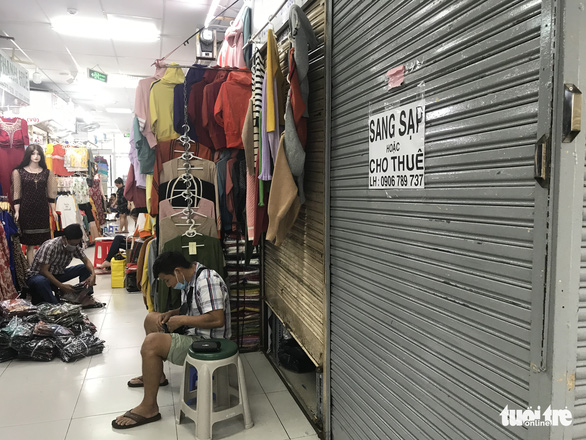Tran Kim Thu, who owns a clothes stall in Ben Thanh Market in HCM City, says: “The maximum sales per day now are only around VND2 million (US$87). It must be at least VND6 million ($262) to break even.”

Tran Kim Thu, who owns a clothes stall in Ben Thanh Market in HCM City, says: “The maximum sales per day now are only around VND2 million (US$87). It must be at least VND6 million ($262) to break even.”
Now only around 500 stalls are still open, or a sixth of the normal number.
Most smaller traders have closed to reduce costs or are trying to sell their shop, Thu said.
One of the city’s oldest markets has just a few dozen visitors during weekends compared to thousands before the COVID-19 pandemic.
Most of its 3,000 stalls, which used to sell garments, footwear, and handcrafts, are closed.
According to the management, most stalls except those selling fresh produce have few customers, especially handbags, clothing and handicrafts shops.
Shops selling Vietnamese handicrafts and fried seafood, favoured by both foreign and local visitors, have been closed since March 2020.
“The impact of the pandemic on my business began last February,” Nguyen Thi Thom, who sells handicrafts, said.
Many other markets in the city including An Dong in District 5, Binh Tay in District 6 and Soai Kinh Lam in Cho Lon (Big Market) in District 5 face similar woes.
Most stalls at these places used to hire at least three salespeople, but no longer, and many have even had to shut down due to lack of business.
Ho Minh Chinh, an economist, said shop owners at traditional markets are also selling online to improve revenues.
Though usually not thought to be tech-savvy, they have been focusing on online sales and networking to survive amid the pandemic, and many are even thriving.
Tran Kim Hue, who sells clothes at An Dong Market, said for the past two months her daughter has been showing her how to use Facebook and Zalo to sell her products.
Trinh Thai Nhung, another clothes seller in the same market, said after taking part in an online Cho Lon Market fair last September, she has been able to network with many businesses, including Co.opmart, which has greatly benefited her business and employees.
She has asked An Dong Market too to organise online market fairs.
Foodstuff, fruit and vegetable traders at Ben Thanh Market are selling their products via Grab.
Duong Thi Thanh Thuy, a confectionery seller, said while her family business had been relying on customers and tourists over the last 60 years, she now has to make use of technology.
Some traders said selling online has not been profitable so far since it is still new to them but could be more profitable in the long run.
Ben Thanh Market is working with the District 1 Information Technology Centre to improve its website to help its tenants sell online.
Tran Huy Cuong, director of the District 5 Centre for Economic Development and Labour Supply Assistance, said the district has organised online fairs to help traders get used to online channels.
They are also being taught how to use social media to sell their goods, take photos and write about their products, he added.
According to the city Department of Industry and Trade, online shopping has gradually become popular after the long period of restrictions due to the pandemic, relentless rise in fuel prices and decreasing incomes, which has caused people to cut spending.
It plans to support small businesses by continuing to reduce taxes and extend the payment deadline.
Last year, to support small businesses and traders at traditional markets affected by the pandemic, city authorities instructed traditional markets to reduce their rents by 50 per cent for six months. — VNS





